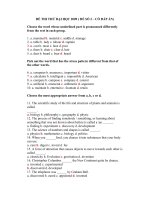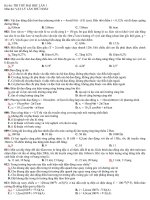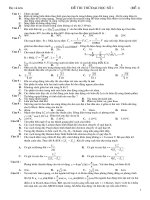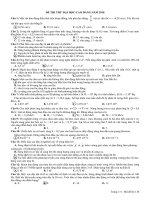Tài liệu ĐỀ THI THỬ ĐẠI HỌC 2009 ( ĐỀ SỐ 2 – CÓ ĐÁP ÁN) docx
Bạn đang xem bản rút gọn của tài liệu. Xem và tải ngay bản đầy đủ của tài liệu tại đây (291.73 KB, 8 trang )
ĐỀ THI THỬ ĐẠI HỌC 2009 ( ĐỀ SỐ 2 – CÓ ĐÁP ÁN)
Choose the word whose underlined part is pronounced differently
from the rest in each group.
1. a. mammal b. material c. saddle d. manage
2. a. table b. lady c. labour d. captain
3. a. cost b. most c. host d. post
4. a. there b. chair c. clear d. hair
5. a. dear b. beard c. beer d. heard
Pick out the word that has the stress pattern different from that of
the other words.
6. a. computer b. museum c. important d. visitor
7. a. calculator b. intelligent c. impossible d. American
8. a. compare b. compose c. company d. consist
9. a. artificial b. aristocrat c. arithmetic d. argument
10. a. maintain b. entertain c. fountain d. retain
Choose the most appropriate answer from a, b, c or d.
11. The scientific study of the life and structure of plants and animals is
called
______.
a. biology b. philosophy c. geography d. physic
12. The process of finding somebody / something, or learning about
something that was not known about before is called a /an ______.
a. finding b. experiment c. discovery d. development
13. The science of numbers and shapes is called ______.
a. physics b. mathematics c. biology d. politics
14. When you ______food, you chance it into substances that your body
can use.
a. cure b. digest c. invent d. fee
15. A force of attraction that causes objects to move towards each other is
called ______.
a. electricity b. Evolution c. gravitation d. invention
16. Christopher Columbus ______ the New Continent quite by chance.
a. invented c. experimented
b. discovered d. developed
17. The telephone was ______ by Graham Bell.
a. discovered b. cured c. appointed d. invented
18. Issac Newton had to do many ______ before he could produce an
electric lamp.
a. discoveries b. inventions c. experiments d. developments
19. Most of the experiments are carried out in ______ .
a. laboratories b. farms c. fields d. schools
20. Charles Darwin was the father of the ______ of evolution.
a. practice b. project c. theory d. problem
Read the passage and then decide which word (a, b, c or d) best fits
each space.
It is estimated (the (21) ______ number is not known that worldwide
some 60,000 newspapers exists, with a (22) ______ circulation of nearly
500
million. However, the number of readers is (23) ______ greater-as many
as three times the circulation figure. This is because newspapers are
shared, some are posted, and (24)______ placed in libraries and other
(25) ______ places. Worldwide, about 8,000 of these newspapers are
dailies. About a third of all newspapers are
published in North America, (26) ______ third in Europe, and the (27)
______ third in the rest of the world. Countries with the highest
newspaper (28) ______ are Britain, Norway, Denmark, Sweden, Japan,
and the United States.
Europe has nearly half of the world's total newspaper circulation, North
America about a quarter, and the rest of the world another quarter. Taking
the world (29) ______ , the average circulation of dailies per 1,000
persons is about 100, but there are many parts of the world where the
modern newspaper is (30) ______ ever seen.
21. a. correct b. exact c. right d. precise
22. a. combined b. connected c. linked d. mixed
23. a. even b. more c. far d. very
24. a. the rest b. another c. the others d. others
25. a. public b. common c. open d. shared
26. a. the next b. the other c. another d. the last
27. a. spare b. extra c. left d. remaining
28. a. readers b. readership c. buyers d. subscribers
29. a. as a whole b. in all c. generally d. on general
30. a. not b. almost c. scarcely d. seldom
Choose the word or phrase that best completes the sentence.
31. It's quite a long way, isn't it? We ______ about five miles by the time
we
get back, I'd say.
a. have walked c. will have walked
b. had walked d. would have walked
32. You can apply for a better job when you ______ more experience
a. have b. had c. have had d. had had
33. ______ I leave home ______ the journey is because the buses aren't
so crowded.
a. The earlier...the easier c. The earlier...the easy
b. The early...the more easy d. The early...the most easy
34. We ______ that game when we were younger.
a. use to play c. used to play
b. used playing d. use to play
35. If Mathew ______ his alarm clock, he wouldn't have overslept.
a. have set b. set c. had set d. was setting
36. I decided to stay at home last night. I would have gone out if I ______
so tired.
a. wasn't b. weren't c. wouldn’t have been d. hadn’t been
37. Why did you stay at a hotel when you went to New York? You with
______ Barbara.
a. can stay c. could have stayed
b. could stay d. have stayed
38. Linda has lost her passport again. It's the second time this ______.
a. has happened c. happened
b. happens d. to happen
39. She tried to be serious but she couldn't help ______.
a. laughing c. that she laughed
b. to laugh d. laugh
40. 'Do you know where ______?' 'No, he didn't say.'
a. Tom has gone c. has gone Tom
b. has Tom gone d. Tom go
41. We gave ______ a meal.
a. at the visitors c. the visitors
b. for the visitors d. to the visitor
42. The ______ produced at our factory in Scotland.
a. good are b. good is c. goods are d. goods is
43. Is that my key, or is it ______ ?
a. the yours b. you c. have had d. yours
44. She doesn't live here ______.
a. no longer b. some more c. no more d. any longer
45. The young man seems very ______.
a. sensible b. sense c. sensibly d. senses
46. I'm not very good ______ repairing things.
a. at b. for c. in d. with
47. My boys always postpone ______ things.
a. done b. do c. to do d. doing
48. A friend of mine phoned ______ me to a party.
a. for invite c. so that inviting
b. to invite d. invited
49. He's lazy. He never does ______ work.
a. some b. any c. no d. none
50. I'll be in London next week. I hope to see Tom ______ there.
a. while I will be c. during I will be
b. while I am d. during I am
Choose the underlined part (a, b, c, or d) that is incorrect.
51. The rain came sudden and everybody got wet because nobody
a b c
had an umbrella.
d
52. Children nowadays seem to be more intelligenter than their
a b
parents when they were at the same age.
c d
53. When I came in, my father was talking to anyone so I went
A b c
out quietly.
d
54. I want to try on the blue skirt over there. Can you showing me
a b c d
the changing room?
55. Can you make me a cup of coffee? No, there are no coffee left.
a b c d
56. Ha Anh can now speak English more well than the last time I met
him.
a b c d
57. I am sorry that I could not go to your birthday party. Any
a b c
problems occurred and I could not go.
d
58. There are many ways to do this exercise but mine is the best good one
a b c d
59. She can sing very beautiful and dance very gracefully but she
a b
cannot do any difficult math exercise.
c d
60. With this type of exercise, reads the questions first and then
a b
read the text to find the correct answer.
c d
Read the passage and choose the best answer.
Our demand for water is constantly increasing. Every year there are
more and more people in the world. Factories turn out more and more
products and need more and more water. We live in a world of water. But
almost all of it - about 97%-is in the oceans. This water is too salty to be
used for drinking, farming, and manufacturing. Only about 3% of the
world's water is fresh. Most of this water is not easily available to man
because it is locked in glaciers and icecaps.
There is as much water on earth today as there ever was or will ever
be. Most of the water we use finds its way to the oceans. There, it is
evaporated by the sun. It then falls back to the earth as rain. Water is used
and reused over again. It is never used up. Although the world as a whole
has plenty of fresh water, some regions have a water shortage. Rain does
not fall evenly over the earth. Some regions are always too dry, and
others too wet. A region that usually gets enough rain may suddenly have
a serious dry spell and another region may be flooded with too much rain.
61. All of the following statements can be inferred from the text
EXCEPT
a. We need more and more water.
b. The population of the world is increasing every year.
c. Most of the world’s water is locked in glaciers and icecaps.
d. Factories also need more water.
62. Which of the following is NOT true about the world’s water?
a. The vast majority of the world’s water is ocean (or salty) water.
b. Ocean water is salty enough to be used for drinking, farming, and
manufacturing.
c. Most fresh water is locked in glaciers and icecaps.
d. The percentage of fresh water is very small.
63. What can be inferred about water?
a. The amount of water on earth is always the same.
b. Water will probably be exhausted.
c. Water can be used once only.
d. Most of the water we use is rain water.
64. It can be inferred from the text that ______









